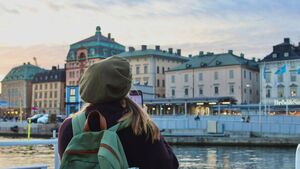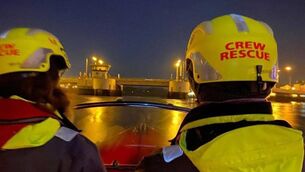Catherine Drea: Learning to prepare for the worst

'The whole approach by Sweden is to include and educate the ordinary citizen'
Last week I found myself running wild in the Viking Museum in Stockholm. I had insisted on taking a boat out to a small island, as I wanted to stroll through the magnificent old forest all the way to Rosendal, the organic gardens and cafe.
But after the ferry boat docked, the first thing I saw was the Viking Museum and, of course, I had to check it out. From the very start of the guided tour I had two thoughts running through my over-excited brain. Waterford is Ireland's oldest Viking City, not Dublin as written on their poster, and redheaded women were stolen from Ireland and brought to Iceland and other northern places because they were so beautiful.
Well, you know that I had to set the record straight about Vedrarfjordr. Also, the guide had magnificent long red hair so without further ado I told her my tale of the trafficking of Irish women because of their Celtic beauty. She already knew the story so we enjoyed a good giggle about that.
Stockholm is a beautiful city built on 14 islands and, in spite of a very cold climate in winter, there is always a warm glow from the golden coloured architecture of honey yellow, peach and pink. The windows of shops and homes are lit up with candles and lights making it the most welcoming and cosy place to be.
I have family there that now extends to a new younger generation, as Sweden has been my sister’s home for more than 40 years. It’s a green, clean and magical place. Myself and my three sisters had a wonderful few days, walking, eating, chatting non-stop.
It used to be a very expensive place to visit, but now our euros are stronger and it is less expensive than Ireland.
You would notice that there is no dereliction, homes are small but warm and affordable, good design matters and is valued, and there is still a strong culture of Swedish food and language. Swedes can be serious and quiet compared to ourselves, I even remember my sister telling us all to shush when we used to go there, delighted with our loud carry on and craic!
But now Sweden is up against some very belligerent neighbours. On the day I came home, the Swedish government issued a booklet advising its citizens on how to prepare for war and teaching people how to brace for a potential Russian attack. Imagine!
It outlined the intended warning systems, how to seek shelter during an air raid, how to ensure your digital security and even how to manage your fear and anxiety.
“We live in uncertain times. Armed conflicts are currently being waged in our corner of the world. Terrorism, cyber attacks, and disinformation campaigns are being used to undermine and influence us,” the booklet says.
The booklet then goes on to tell people how they can get involved in a volunteer defence organisation, take a course in emergency CPR, donate blood, or talk with neighbours about how to become more prepared.
“To resist these threats, we must stand united. If Sweden is attacked, everyone must do their part to defend Sweden’s independence — and our democracy. You are part of Sweden’s overall emergency preparedness.”
I was shocked. But my family and the people of Sweden have lived with escalating conflict on their borders now for years. They seem sanguine about this deepening crisis. As we are now part of an integrated Europe, how involved will we be in the extending and escalating war on those Eastern borders of the EU?
Within hours my family were talking about updating all their Irish passports and studying this Swedish Government advice. It got me thinking about our own election coming up and whether any of the parties or individuals had a plan for us? What if there is a nuclear accident or threat? What if there is an invasion of EU territory? What if there is another emergency evacuation but of Sweden this time, or Poland?
This is the sentence that struck me most in the booklet, “You are part of Sweden’s overall emergency preparedness.” The whole approach by Sweden is to include and educate the ordinary citizen. So I went to check on the manifestos of the various parties in Ireland. How are they planning to prepare the population for a possible disaster or crisis affecting us in the future? Nothing!
There is scant mention of citizen emergency education in any of them. Given the experience of the pandemic and our geographic isolation, it seems that some sort of preparation might be an important part of future planning for us and our communities.
We tend to see the world as our playground. Flying here or there, holidaying in sunny spots, visiting our family wherever they may be around the world. When myself and the sisters began to talk about going somewhere sunny next year we found it hard to think ahead given the uneasy situations around the world and now right at my sister’s doorstep.
It is clear that we have come a long way in our public transport, infrastructure and our place in the world. In the old days, leaving a modern country like Sweden to come home was like taking a step backwards. Not any more. But we still have lessons to learn about being prepared for the worst, while maybe hoping for the best.






